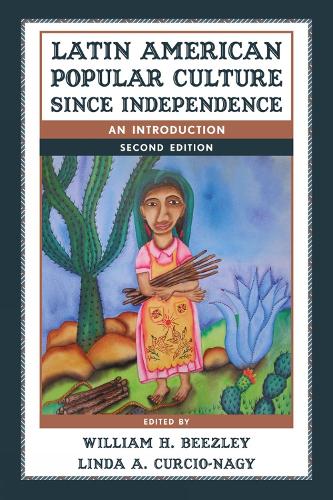
Latin American Popular Culture since Independence: An Introduction
(Paperback, Second Edition)
Publishing Details
Latin American Popular Culture since Independence: An Introduction
By (Author) William H. Beezley
Edited by Linda A. Curcio-Nagy
Bloomsbury Publishing PLC
Rowman & Littlefield Publishers
10th October 2011
Second Edition
United States
Classifications
Tertiary Education
Non Fiction
306.098
Physical Properties
Paperback
368
Width 154mm, Height 232mm, Spine 21mm
531g
Description
This unique reader offers an engaging collection of essays that highlight the diversity of Latin Americas cultural expressions from independence to the present. Leading historians explore funerals, dance and music, letters and literature, spectacles and monuments, and worlds fairs and food. These themes and events highlight the ways in which a wide range of individuals with copious, at times contradictory, motives attempted to forge identity, turn the world upside down, mock their betters, forget their troubles through dance, express love in letters, and altogether enjoy life. The authors analyze case studies from Argentina, Brazil, the Dominican Republic, Ecuador, Mexico, Nicaragua, Peru, and Trinidad-Tobago, tracing how their examples resonate in the rest of the region. They show how people could and did find opportunities to escape, if only occasionally, their daily drudgery, making lives for themselves of greater variety than the constant quest for dominance, drive for profits, or knee-jerk resistance to the social or economic order so often described in cultural studies. Instead, this rich text introduces the complexity of motives behind and the diversity of expressions of popular culture in Latin America.
Contributions by: Sal Acosta, Thomas L. Benjamin, John Charles Chasteen, Darin J. Davis, Lauren (Robin) H. Derby, Matthew D. Esposito, Ingrid E. Fey, Stephen Jay Gould, Graham E. L. Horton, Fanni Muoz Cabrejo, Blanca Muratorio, Jeffrey M. Pilcher, Janet Sturman, and Pamela Voekel.
Reviews
William Beezley and Linda Curcio-Nagy demonstrate the centrality of popular culture to the understanding of history. They analyze song, dance, ceremony, funerals, regalia, icons, exhibitions, protest, and literature to measure values and provide deep insights regarding class, gender, and race. This book is a tour de force. -- John Mason Hart, University of Houston
This revision of a foundational text on the history of Latin American popular culture brings exciting energy to an already dynamic field. New essays and the revised introduction further expand our understanding of a wide range of everyday cultural practicesmusic, dance, love letters, funerals, cooking, popular celebrationsand their complex relationship with elite national building projects. In conjunction with the best essays from the previous edition, this new material gives us a fascinating, provocative, and insightful glimpse into a vital aspect of Latin American historyone that still eludes most historical studies of the region. Reading this edition, I was struck even more forcibly by the ingenuity of historians of popular culture and by the impossibility of making sense of Latin American history without it. -- Robert Buffington, University of Colorado
Latin American Popular Culture since Independence demonstrates that history can be serious fun. This wide-ranging collection leads the reader along less traveled paths through Latin Americas last two centuries. Moreover, it brings together a distinguished group of talented researchers who share their expertise with wit and sensitivity. The individual essays truly bring unvarnished practices and unheralded historical actors to life, whether they treat religion, dance, death, food, or forms of story telling. Aside from describing past practices, these scholars also examine historical efforts to alter and shape popular culture and fashion national identity. It is a truly riveting examination of culture as lived, invented, and often manipulated in modern Latin American history. -- Edward Wright-Rios, Vanderbilt University
Recommended. * Library Journal *
An excellent means of introducing students at all levels to the central importance of dance, music, food, spectacle, and monument to the history of Latin America over the last two hundred years. -- William E. French, University of British Columbia
Author Bio
William H. Beezley is professor of history at the University of Arizona. Linda A. Curcio-Nagy is associate professor of history at the University of Nevada, Reno.
